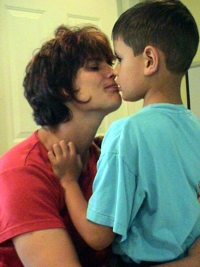Children with Severe or Classic Autism

Steven Wertz has extensive experience in helping individuals with severe autism. This experience has convinced him that all people with autism, even those whose difficulties are most profound, can continue to grow, develop and improve as long as they have access to a program that is optimized for their particular needs.
Recommended for:
- Children, teens or adults who have been diagnosed with any of the following terms: severe autism, profound autism, autistic disorder, low-functioning autism, classic autism or “Kanner” autism.
- Children, teens or adults on the autism spectrum who are not functioning well, not talking and not responding to requests or instructions — or who are doing these things on a very infrequent basis.
- Children, teens or adults with obvious movement problems.
- Parents who have seen signs that their child is more intelligent than the conclusions of previous evaluations indicate and parents who know that their child has more potential than his or her evaluations or diagnosis suggest.
The Growing Minds Perspective on Severe Autism
In our experience, the more severely autistic an individual is considered, the more frequently mistakes are made in assessing and treating him or her. In addition, the more severely autistic an individual seems to be, the more often erroneous assumptions are made about his or her state of mind. The intelligence of these individuals is frequently underestimated.
Many programs for ASD are designed to address only those issues thought to be common among most people with autism. Thus most autism programs are not well adapted for individuals with more severe difficulties in functioning. As a result, those with more severe autism seldom progress well in autism programs, not because they are unable to make progress, but because the programs are not well designed for their needs. The Growing Minds team has extensive experience in assessment and targeted program methods for these issues.
In most cases, when a person comes to us diagnosed with severe autism, we are able to determine that their difficulties are more compound and complex than the diagnosis of autism indicates. For example, the person is autistic, but also has significant motor planning and motor control difficulties (dyspraxia). Or the person is on the autism spectrum, but this is combined with rather severe executive function difficulties. (Executive function is a set of skills that enable people to engage in goal directed behavior. Sometimes, if there is a neurological impairment, executive function is affected.)
It can be a mistake to think that the autism is more severe. In fact, the problem is not the degree of severity of the person’s autism, but autism in combination with other difficulties.
Dyspraxia and executive function can have nothing to do with intelligence. A person can have a genius IQ, and have severe motor or executive problems. Most people described as severely autistic have also been diagnosed “retarded” because they score low on an IQ test. However, this is “functional IQ.” It is not a measure of cognitive ability, but a measure of how well the person can function on an IQ test. Until that person is functioning better, no one will be able to accurately assess his or her level of intelligence.
Our Programs for Individuals with Severe Autism
Helping a person with compound and complex neurological difficulties requires a special set of eyes and a special set of helping skills. First, we must observe and assess carefully, considering the possibility of dyspraxia and executive function, as well as other possible neurological difficulties.
 After careful assessment, learning goals need to be broken down into more basic steps than most professionals are accustomed to doing. Next, we often need very specialized teaching methods to accomplish those goals. Even if many previous attempts to teach the child have failed, we do not regard the learner as the problem. The problem is that most teaching methods will not work for children with these issues.
After careful assessment, learning goals need to be broken down into more basic steps than most professionals are accustomed to doing. Next, we often need very specialized teaching methods to accomplish those goals. Even if many previous attempts to teach the child have failed, we do not regard the learner as the problem. The problem is that most teaching methods will not work for children with these issues.
Steven is highly experienced in assessing for compound and complex difficulties, in setting appropriate treatment goals, breaking down learning tasks for individuals with these issues and measuring the child’s progress to determine whether our assessment, goal setting and teaching methods are on track.
Getting Started
Due to the need for a thorough and accurate assessment and customized curriculum design, we strongly recommend a 4-day, in-person program for children with more severe issues. The program continues with 6 months of distance follow-up and training by phone and video conferencing. While there are strong advantages to conducting the initial in-person training at our Broomfield, Colorado location, we have limited openings for families whose special circumstances make it necessary to hold the training in your home.
We also offer a 4-session, distance Consultation Series (by internet and phone) for parents interested in experiencing our services to decide if we are a good fit for your needs.
Register Now